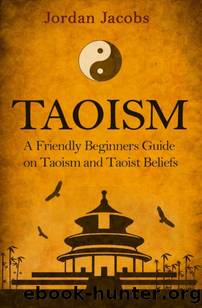Taoism: A Friendly Beginners Guide On Taoism And Taoist Beliefs by Jordan Jacobs

Author:Jordan Jacobs [Jacobs, Jordan]
Language: eng
Format: epub
Amazon: B01010DOHO
Goodreads: 25761043
Published: 2015-06-18T05:00:00+00:00
Western management theories vs. Taoism
Douglas McGregor developed the leadership theories namely Theory X and Theory Y. Theory X believes in a leadership style that exercises compliance and control. Leaders assume various situations, such as: the followers avoid work as they dislike it; they do not feel the need of being led; they are unwilling to accept responsibility; and hence, demand supervision to achieve organizational goals. Theory Y propagates a leadership style that focuses on people management through participation, delegation and collaboration. This theory believes followers are eager to take responsibility; they have a willingness to work; and take initiatives to achieve the objectives of the organization. Followers help their leaders achieve goals because of positive reinforcement.
McGregor developed another theory, known as Theory Y. This stresses management or leadership through input, collaboration and delegation. According to Theory Y, people want to work, they are willing to accept responsibilities, and they are ambitious and demonstrate initiative to achieve an objective. People can attain goals with positive motivation.
Abraham Maslow propounded the theory of hierarchical needs. It is greatly influenced by the Taoist principles and emphasizes self-actualization and human dignity. Maslow believes any style of individual leadership influences only certain instances. A Taoist leader keeps away from the power of instructing his followers. A direct connection is found between Taoism and human psychology through the concept of leadership developed by Maslow.
However, there are certain implications of Taoist leadership.
First, modern scholars are less aware about Maslowâs theory of leadership. Taoism offers a broad perspective for academic, social, and behavioral purposes. Second, Taoism helps modern leaders to practice effective leadership. Taoism may fill the void in the western philosophy of managing people. Third, research studies based on Taoist leadership highlights empirical investigations of social, behavioral and management sciences. Next, studies on Taoism reduce human conflict. The Taoist principles create harmony of the self with the nature and other living beings. Todayâs world is akin to a global village and the inhabitants dwell on numerous human and environmental concerns. Perhaps, Taoism is the most valuable asset for the global inhabitants.
Download
This site does not store any files on its server. We only index and link to content provided by other sites. Please contact the content providers to delete copyright contents if any and email us, we'll remove relevant links or contents immediately.
The Way of Zen by Alan W. Watts(5809)
Ego Is the Enemy by Ryan Holiday(4000)
The Art of Happiness by The Dalai Lama(3391)
The Book of Joy by Dalai Lama(3234)
Why Buddhism is True by Robert Wright(2833)
Shift into Freedom by Loch Kelly(2698)
Spark Joy by Marie Kondo(2686)
Happiness by Matthieu Ricard(2529)
A Monk's Guide to a Clean House and Mind by Shoukei Matsumoto(2409)
The Lost Art of Good Conversation by Sakyong Mipham(2129)
The Meaning of the Library by unknow(2073)
The Third Eye by T. Lobsang Rampa(1887)
The Unfettered Mind: Writings from a Zen Master to a Master Swordsman by Takuan Soho(1863)
Anthology by T J(1758)
Red Shambhala by Andrei Znamenski(1752)
The Diamond Cutter by Geshe Michael Roach(1675)
Thoughts Without A Thinker: Psychotherapy from a Buddhist Perspective by Epstein Mark(1596)
Advice Not Given by Mark Epstein(1524)
Twilight of Idols and Anti-Christ by Friedrich Nietzsche(1498)
